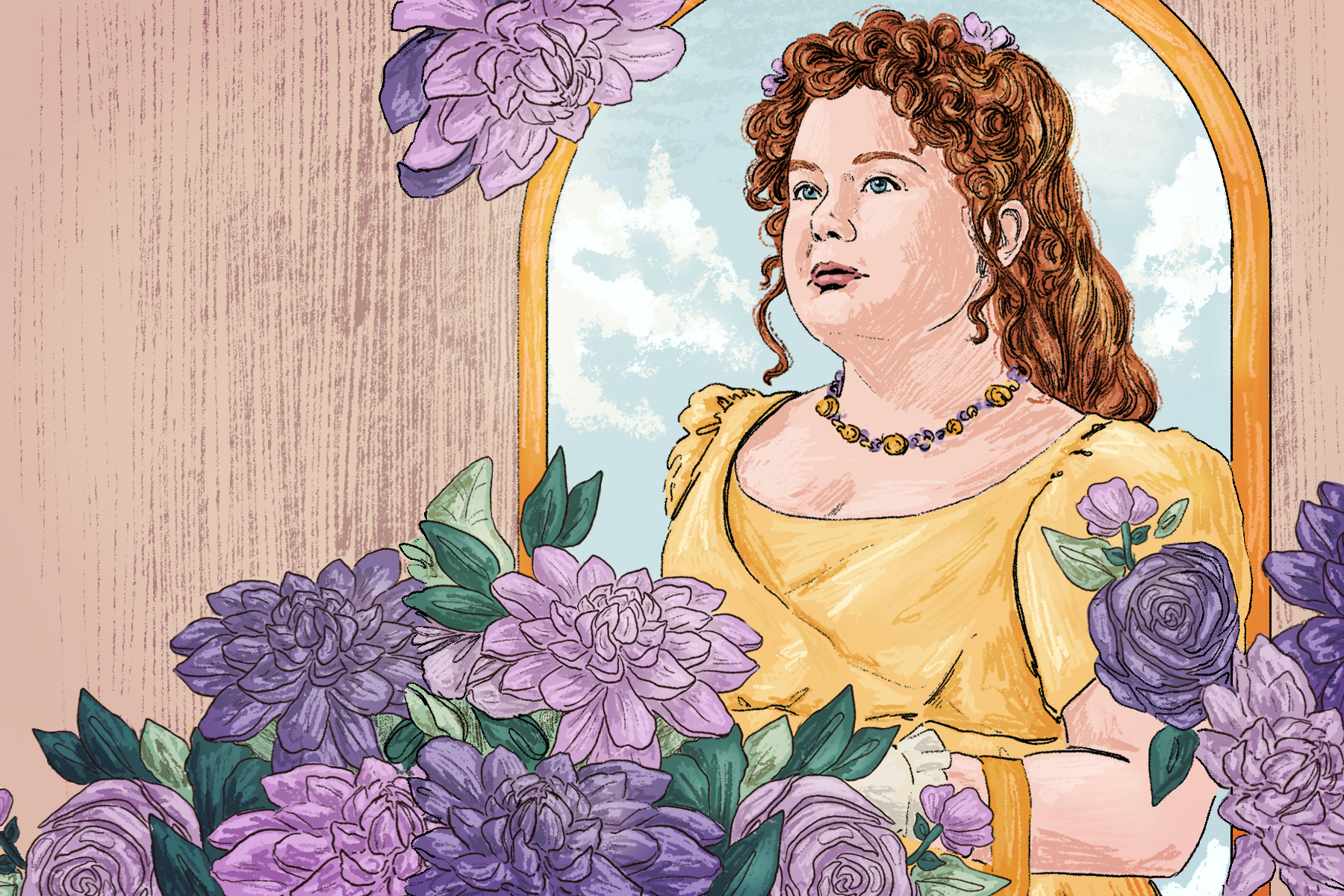Warning to the reader: Spoilers for the TV and book series “Bridgerton” ahead!
Love her or hate her, Penelope Featherington is undoubtedly one of the standout characters on the popular Netflix series “Bridgerton.” The show revolves around the eight Bridgerton children (Anthony, Benedict, Colin, Daphne, Eloise, Francesca, Gregory and Hyacinth) as they navigate the competitive world of Regency London’s high society, or “ton,” during the social season. Although Penelope is not a main character (not yet, anyway) she still takes center stage in many scenes as Lady Whistledown, the anonymous writer of a social pamphlet that details the gossip of the ton. Over the course of 16 episodes, she has proven to be one of the series’ most multifaceted and compelling characters.
Still, some fail to appreciate the intricacies of Penelope’s character. Many write her off as a terrible person that does not deserve any love or happiness, condemning her for the actions she takes as Lady Whistledown. While there is some merit to such accusations, Penelope is ultimately on the receiving end of intense ire because she is two things: fat and female.
From Page to Screen
In Julia Quinn’s “Bridgerton” novel series, which inspires the Netflix show, Penelope is a peripheral character with an overbearing mother who fails to take her seriously. She is no more than a side character until the fourth book in the series, “Romancing Mr. Bridgerton,” where she takes center stage. While her alias, Lady Whistledown, is a key figure throughout the books, she is much more subdued than the Lady Whistledown of the show — whose words carry more and more of a bite with each episode. In the books, however, Penelope grows to be kind, intelligent and quick-witted.
But the Netflix series transforms Penelope into a fully fleshed out and central character, allowing her to embrace a quality that most female characters lack: moral complexity.
The Double Standard
People love and desire complicated characters — but only when said characters are men. Audiences allow male characters to be strategic, spiteful, kind, stubborn and every other adjective in the book because their complicated personalities supposedly make them interesting. Because of that, fandoms and general audiences typically love and defend male characters with zeal. Male characters can make a mess of everything, but it won’t matter in the end; shows will miraculously solve or ignore said mess altogether. It’s easier for audiences to forgive a man than a woman.
Conversely, a female character cannot be strategic or spiteful or stubborn or even kind at times — for many see compassion as weak and passive. She must never attempt to escape the box of conformity. In the face of such limitations, however, audiences still expect her to serve a compelling purpose within the larger narrative. In other words, audiences demand that female characters add complexity to the plot yet villainize them whenever they attempt to become actual challengers or figures of influence within the story.
Anthony Bridgerton
This double standard becomes evident when comparing Penelope Featherington with fan favorite (and “Capital R Rake”) Anthony Bridgerton. Anthony is an incredibly complicated character. As a viscount, he feels an immense amount of pressure to ensure the future success of the Bridgerton family. He manifests this pressure in a multitude of ways: arrogance, absolutism, promiscuity and a crippling inability to commit to love.
Anthony’s flaws, in turn, negatively affect the women on the show. In fact, during the season that focuses on his character, all of his poor qualities come to a head and result in a major conflict between the Sharma sisters, Kate and Edwina. Because Anthony feared committing to a loving relationship, he decided to propose to Edwina rather than come to terms with the fact that he loved Kate. Anthony dragged his commitment issues out over the entire season, made a fool of two sisters whom the ton already ostracized, brought an avoidable scandal upon his family and, in the end, still came out unscathed because the queen showed him mercy. Not to mention that, in the first season, he shot down every decision that his younger sister, Daphne, wanted to make, shirked off his responsibilities as viscount and instigated an illegal duel (among other blunders).
Despite all of his shortcomings, writers and audiences did not hold Anthony Bridgerton’s missteps against him. He received just enough grace from the other characters and viewers to merit a redemption — a justification for his bad behavior. Thus, Anthony escaped condemnation.
Penelope Featherington
Penelope, however, remains a contentious character. A lot of the vitriol directed at her character stems from the fact that, as Lady Whistledown, Penelope took actions that many consider unforgivable. For instance, many fans attack Penelope for outing Marina Thompson’s pregnancy to the whole world and throwing Eloise Bridgerton under the bus in a misguided attempt to protect her. But here’s the thing: Lady Whistledown makes the show interesting. The gossip column she runs creates conflict and shakes the foundation of each character. And, above all, the Lady Whistledown pseudonym adds millions of layers to the wallflower known as Penelope Featherington.
Subverting Expectations
Penelope is an interesting character to watch. On the surface, she comes off as a shy 16-year-old who endures an overzealous bully of a mother, even more intense older sisters and financial hardship because her father gambled away his daughters’ dowries. Viewers expect her to be meek, to reject her family’s negative qualities — careful manipulation of the ton, an intense need to gamble, scheming — but she doesn’t. On the contrary, she absorbs her family’s vices and molds them to suit her own ends, which enables her to run her Lady Whistledown operation with ease.
Penelope eavesdrops on gossip by way of her wallflower status, learns the ins-and-outs of the publishing industry for her Lady Whistledown column and masterfully negotiates with the printer of said column to secure fair wages for the paperboys and herself. In an era where women must depend on men for literally everything, Penelope Featherington runs her own business — a business that has the ton eating out of her hand, hanging onto every word she writes. As the saying goes, Penelope is a character who got it “out the mud.”
Yet audiences overlook Penelope’s diligence, intelligence and business-savvy because of what she writes as Lady Whistledown. While what Penelope did to Marina Thompson is a valid reason to dislike her, her actions as Whistledown ultimately come from a place of defense. Penelope outed Marina because she wanted to protect Colin Bridgerton from a loveless marriage. Moreover, she threw Eloise under the bus in her column to throw off the queen, who was suspicious that Eloise was Whistledown. In doing so, Penelope ensured that the queen’s misplaced suspicions didn’t land Eloise in prison for treason.
The Curse of the Complex Female Character
Fans of the show don’t give Penelope the grace or mercy that they show other characters — even though she is a teenager who grew up in an unstable household, which forced her to find other methods of survival. The general audience fails to give her the benefit of the doubt because Penelope defies their expectation that, as a fat woman, she must remain a side character. Penelope operates at the forefront of the show. Moreover, she resides in a “deviant” body that many audience members consider an object of public scrutiny. A large number of fans took to Twitter to ridicule her physique, stating that they would “feel uncomfortable” watching Penelope’s sex scenes in the show.
Penelope Featherington is pivotal to “Bridgerton.” Lady Whistledown is responsible, whether directly or indirectly, for all of the show’s moving parts, drama and intrigue. But fans continue to vilify her character — just as author Julia Quinn predicted. One of the books’ most iconic quotes about Penelope reads: “Penelope wouldn’t be praised for being clever or witty or daring. She’d be called mean, petty, and jealous.”
Perhaps it’s time that audiences allow female characters to be mean, petty and jealous as well as clever, witty and daring. The expectation that every woman must contribute to the overarching narrative of a story in a significant yet socially acceptable way is incredibly unfair. A female character does not need to conform to audiences’ standards of womanhood to add meaningful action, conflict and psychological complexity to stories. Audiences must learn to embrace the complicated female character — even if she is spiteful.
















